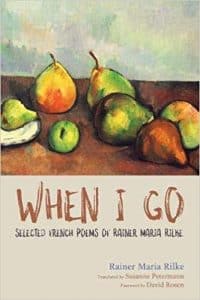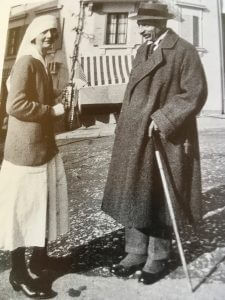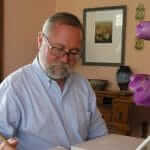Review: When I Go: Selected French Poems of Rainer Maria Rilke translated by Susanne Petermann
Review by Art Beck
 I like this book a lot. In large part because it addresses a need for a substantial, “curated” selection from the some four hundred poems Rilke wrote in French in the last years of his life. But no less because of the largely even readability of the translations which speaks to what seems a high level of engagement and internalization of the original poems by the translator.
I like this book a lot. In large part because it addresses a need for a substantial, “curated” selection from the some four hundred poems Rilke wrote in French in the last years of his life. But no less because of the largely even readability of the translations which speaks to what seems a high level of engagement and internalization of the original poems by the translator.
One criticism of Rilke’s French ouevre is that it pales before the iconic weight of his German masterworks. Susanne Petermann, in her translator’s introduction, offers a corollary take on these “poems in a second language”: That they represent a sort of vacation from Rilke’s just completed Duino Elegies and Sonnets to Orpheus. A winding down, as it were?
There’s something to be said for that because the Elegies and Sonnets, completed in 1922, were his last major work. Was there anything really left for him to say in German? The opening line of a poem that Petermann chose as a title for her selection might be taken to point up the difference between late Rilke in German and “later” Rilke in French. “When I go will I have spoken/ my tormented heart that agrees to go on?”
Petermann comments “What self respecting person in today’s world has not asked this?” The line seems rooted in one of Rilke’s signature themes, a sense of sacred acquiescence to a universal process that both liberates and traps, seduces and kills us. But the emotional surrender of that “agreement .. to go on” is expressed much more forcibly in, say, the Ninth Duino Elegy’s exclamation – Erde, du liebe, Ich will.
The sense of a vacation in another, gentler language-landscape seems nowhere more striking than in lines like this.
Lampe du soir, ma calme confidente,
mon cœur n’est point par toi dévoilé;
on s’y perdrait peut-être; mais sa pente
du côté sud est doucement éclairée.
C’est encore toi, ô lampe d’étudiant,
qui veut que le liseur de temps en temps
s’arrête étonné et se dérange
sur son bouquin, te regardant.
(Et ta simplicité supprime un Ange.)
Evening lamp, quiet companion,
you can’t illuminate my heart;
it’s a space we could get lost in,
but the south-facing slope is softly lit.
Lamp you’re still the one
who wants the reader now and then,
to stop reading, adjust himself
over his book and look at you with amazement
(Your simplicity surpasses an Angel.)
This is a totally different aspect of angelic being than in Rilke’s First Duino Elegy where (in my own translation):
Then even if I screamed to high heaven, who’d listen
to me there among the angelic orders? And
suppose one of them did swoop me to heart:
I’d die, seared by exposure to that stark, concentrated
being….
The parenthesis in the lamp poem is Rilke’s. Perhaps his implicit, quiet finger to the lips nod at the disparity? A reminder that just because he so famously declared: “every one of the angels is horrifying”, doesn’t mean he couldn’t wish for friendlier cherubs. And maybe that’s as good a reason as any to take a rest and read his French poems?
As is a poem as relaxed, chatty, and dare I say, Gallic as this one. It seems totally unlike anything Rilke would allow himself in German:
Combien le pape au fond de son faste,
sans être moins vénérable,
par la sainte loi du contraste
doit attirer le diable.
Peut-être qu’on compte trop peu
avec ce mouvant équilibre;
il y a des courants dans le Tibre:
tout jeu veut son contre-jeu.
Je me rappelle Rodin
qui me dit un jour d’un air mâle
(nous prenions, à Chartres, le train)
que, trop pure, la cathédrale
provoque un vent de dédain.
By the sacred law of opposites
the pope, with all his pomp and finery,
attracts the devil
without being any less venerable.
We often forget that things naturally find equilibrium.
The Tiber has its currents;
all play wants counter-play.
I remember Rodin one day
telling me in his cocky way
(we were leaving Chartres by train)
that, at its purest, the cathedral
stirs up a wind of disdain.
The reader looking for what Marina Tsvetaeva characterized as the “lightning on lightning” aspects of Rilke’s imagery isn’t going to find much of that here. But Rilke’s German verse isn’t all of a piece either. Contrast the seemingly devotional Das Marien-Leben sequence with the almost blasphemous Magdelen Pieta and other naturalistic pieces in the earlier-published New Poems. Even his career culminating bookends, the Duino Elegies and Sonnets to Orpheus, seem to inhabit somewhat different post-Christian cosmologies from each other.

Rilke talking to a nurse in the courtyard of the Valmont sanatorium
It’s become a commonplace observation that Rilke’s first extended stay in Paris in his late twenties marked the flowering of his mature work. And that this was aided by living in a city where German was no longer his everyday spoken tongue, but rather an inner language reserved for poetry.
There’s the feel of something inverse to that in these near end-of-life French poems written in Francophone Switzerland. They touch on many of his old themes, but almost more conversationally than poetically, despite their rhymed French forms. As if they were daybook entries by someone who now finds himself speaking more naturally in facile verse than too slow prose.
For me, they also evoke that sad, late November 1926 photo of Rilke with a cane and hat, too small now for his ankle length overcoat, talking to a nurse in the courtyard of the Valmont sanatorium where he would die within weeks. It also occurs to me that one great value of these French poems is that they allow the master poet to converse with us relieved of the burden of his life’s work. Looking more closely at that photo, both he and the nurse are smiling in the winter sun.
When I Go: Selected French Poems of Rainer Maria Rilke
Translated by Susanne Petermann
Wipf and Stock / Cascade Books
ISBN: 978-1532603327
About the Author
 Art Beck is a poet, essayist and translator with a number of journal credits. and volumes of both original poetry and translations from the late ’70s onward. He has been a not infrequent contributor to Your Impossible Voice. His Opera Omnia Luxorius (versions of the 6th century c.e. North African Roman published by Otis/Seismicity) won the 2013 Northern California Book Award for translated poetry. Mea Roma, a 140 poem, ‘meditative sampling’ of Martial epigrams was published by Shearsman Books in October, 2018. From 2009 through 2012, he was a twice yearly contributor to Rattle’s, since discontinued, e-issues with a series of essays on translating poetry under the byline The Impertinent Duet. Readers of this review might enjoy his 2008 essay on Rilke in Jacket: “And Yet another Archaic Torso, Why?”
Art Beck is a poet, essayist and translator with a number of journal credits. and volumes of both original poetry and translations from the late ’70s onward. He has been a not infrequent contributor to Your Impossible Voice. His Opera Omnia Luxorius (versions of the 6th century c.e. North African Roman published by Otis/Seismicity) won the 2013 Northern California Book Award for translated poetry. Mea Roma, a 140 poem, ‘meditative sampling’ of Martial epigrams was published by Shearsman Books in October, 2018. From 2009 through 2012, he was a twice yearly contributor to Rattle’s, since discontinued, e-issues with a series of essays on translating poetry under the byline The Impertinent Duet. Readers of this review might enjoy his 2008 essay on Rilke in Jacket: “And Yet another Archaic Torso, Why?”
Stay in the Loop
